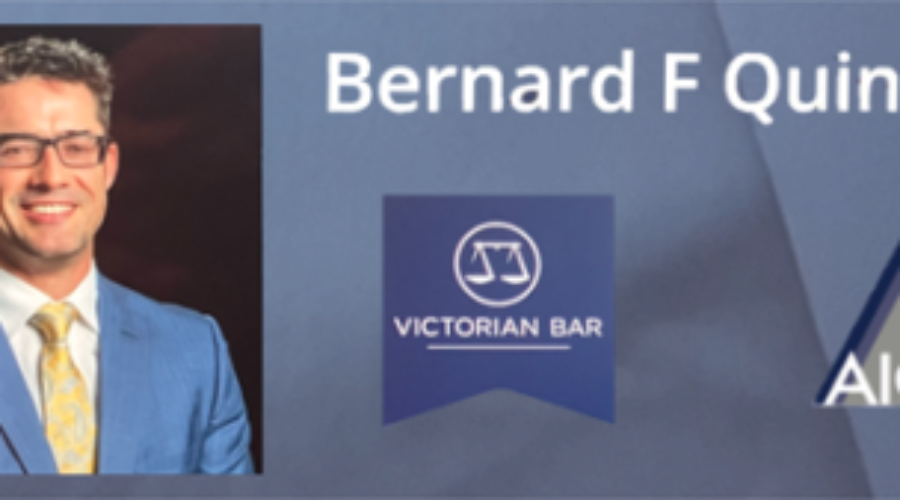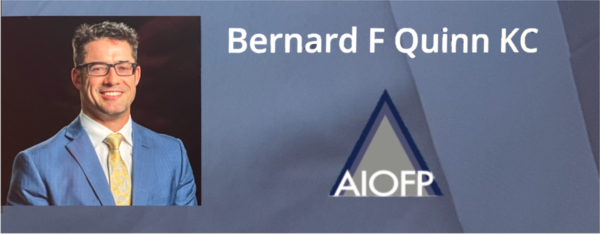Section 99FA – The facts and flaws.
Attached is arguably the best investment the AIOFP has made on behalf of its members and the wider Advice community over the past 26 years. This document has also been forwarded to the other Associations for consideration.
We sought a legal opinion from Financial Services expert and Kings Counsel [KC] Bernard F Quinn on the section 99FA/SIS legislation and its far-reaching negative ramifications for consumers and the Advice profession generally. Hamilton Locke Partner Simon Carrodus recommended Mr Quinn and together with our legal/financial advice expert Lionel Rodrigues, who is a practising adviser, briefed Mr Quinn KC on the relevant areas we needed addressed.
Mr Quinn is widely experienced in the financial services industry including acting for ASIC on occasions. Due to the legal complexity of the interaction between SIS – 99FA – QAR we sought the very best legal minds to clarify troubling aspects that were not in the best interests of consumers or the Advice profession in general. We have concluded that the best legal minds do not reside in Canberra within the public service. It has become quite apparent that the Canberra ‘experts’ who recommended/structured the section 99FA legislation must not understand the various nuances of the legislation they were either consulting on or voting on.
This also applies to our profession where Lionel appears to be one of few people who understands the complexities and nuances. We suggest the Delivering Better Financial Outcomes [DBFO] nomenclature is misleading to all concerned, section 99FA SIS is fundamentally/comprehensively flawed and a very poor outcome for consumers.
We conclude that ASIC, TREASURY, the Minister’s office and all sides of politics could not have fully understood what they were constructing or voting on, and the legislation should be unilaterally abolished. Conversely, if anyone did fully understand what they were doing they should NOT be working for or funded by taxpayers and consumers to act in their best interests.
We believe the Canberra experts must ‘swallow their pride’ and now act in the best interests of consumers by eliminating section 99FA. The AIOFP also believes that the Annual Fee Consent Forms should be abolished. These Consent Forms have unintended consequences and do nothing to reduce ‘red tape’. Originally this was a recommendation by Commissioner Hayne to curtail the Institutional ‘fee for no service’ fiasco. However, as these Institutions have now largely left the profession of Advice, the Annual Fee Consent Forms are no longer relevant. They are simply no longer fit for purpose, Superannuation Trustees don’t want them, clients detest them and they are substantially driving up the cost of advice. The only cohort wanting them are Canberra Bureaucrats who generally know nothing about operating a business or dealing with consumers.
To candidly summarise, currently we have second tier Canberra public service legal minds recommending sub standard policy outcomes to Politicians in Canberra who more than likely have limited knowledge on what they are voting on – Consumers and business deserves better than this. In future we suggest the Government instructs ASIC and Treasury to seek advice from KC’s like Mr Quinn to eliminate unintended consequences and other poor outcomes for Consumers with policy initiatives before Parliamentary consideration.
Below is a summary of the KC Opinion by Lionel Rodrigues which reduces it down to more layman terms for your consideration.
PETER JOHNSTON – EXECUTIVE DIRECTOR – AIOFP
“Opportunity Cost and Opportunities Lost”.
Having been in receipt of the QAR since December 2022, the government finally made amendments to SIS in July 2024, in particular an amended section 99FA which proved to be highly controversial. This centered around the additional compliance burdens being placed on unwilling and understandably unqualified superannuation trustees. The new legislation is problematic from both a regulatory and compliance perspective. It has missed the opportunity to reduce the ‘red tape’ and this lost opportunity has come at a cost to the superannuation member and their nominated professional financial adviser.
The new section 99FA has missed the opportunity to clearly implement Recommendation 7 of the Quality of Advice Review (QAR). This Recommendation 7 was specifically framed such that the existing law was to be changed to enable superannuation trustees to pay advice fees to a financial adviser “on the direction of the member”. There is nothing in the QAR that makes this conditional other than upon the consent of the member. It was not the intent of the Reviewer that the input or approval of the superannuation trustee was required. This was not an additional compliance burden upon trustees, advisers or superannuation members, that was contemplated. The opportunity to reduce ‘red tape’ for all stakeholders has been missed.
Superannuation trustees have been placed in a difficult position, contrary to the explicit aims of Recommendation 7. This is demonstrated in the poor legal drafting of section 99FA. It is drafted as a general prohibition rather than being expressed permissively subject only to the conditions of informed consent and direction of the member. The poor construction of s99FA lacks statutory clarity and may be construed by the Courts as requiring scrutiny of Statements of Advice provided by professional financial advisers. This may inevitably result in trustees adopting a risk averse approach to the detriment of and cost to members.
For the protection of superannuation members, and trustees, there already exists a suite of statutory provisions that requires the professional financial adviser to act in the clients’ best interests. Section 912A of the Corporations Act imposes a responsibility to act “efficiently, honestly and fairly”. Similarly, provisions are contained in s961 imposes a duty to act in the clients best interests. Furthermore, advisers are required under s921U to comply with the Financial Planners and Advisers Code of Ethics 2019. Given that the new s99FA requires that payment to a financial adviser is made for “personal advice”, there are sufficient statutory provisions that preclude the provision of advice to members which would not be in their best interests nor a full disclosure of interests.
The new s99FA also fails to provide clarity for trustees as to what is considered a “members interest in the fund”. Members may wish advice on a number of matters relating to what they, as members, consider to be their interests in a superannuation fund. No guidance is provided in s99FA as to allied advice matters such as insurance strategies, asset allocations, spouse contributions, and Centrelink entitlements, by way of example.
The new section 99FA is inconsistent with the aims and intent of QAR Recommendation 7. Simply put, to cut red tape, it was recommended that advice fees be paid “on the direction of the member”. The QAR did not stipulate any further conditions. The reality is that due to poor legal drafting, the intent of Recommendation 7 has not been achieved, resulting in higher opportunity costs for the member and an opportunity lost to make quality financial advice accessible and affordable.
LIONEL RODRIGUES, MFinPlan, LLM – CHAIR, AIOFP TECHNICAL COMMITTEE.




